Phil Smith, MD, former professor in the UNMC Division of Infectious Diseases and medical director of the Nebraska Biocontainment Unit, died July 22 at the age of 78.
Known as the father of biopreparedness in Nebraska and the state’s first hospital epidemiologist, Dr. Smith leaves a lasting legacy as the man whose foresight and leadership helped place UNMC and Nebraska Medicine at the forefront in the global fight against high-consequence infectious diseases.
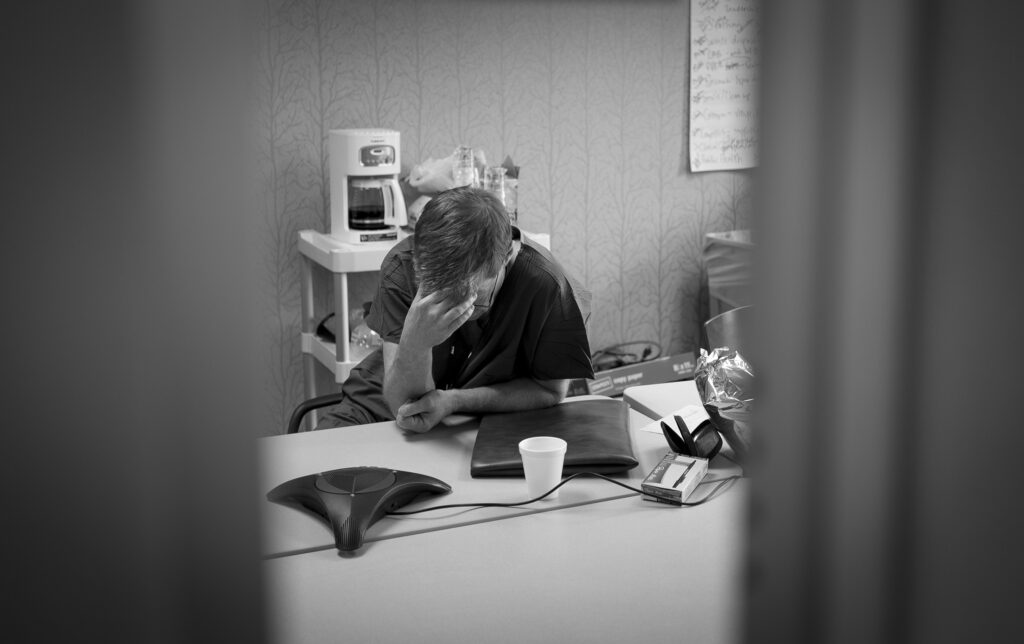
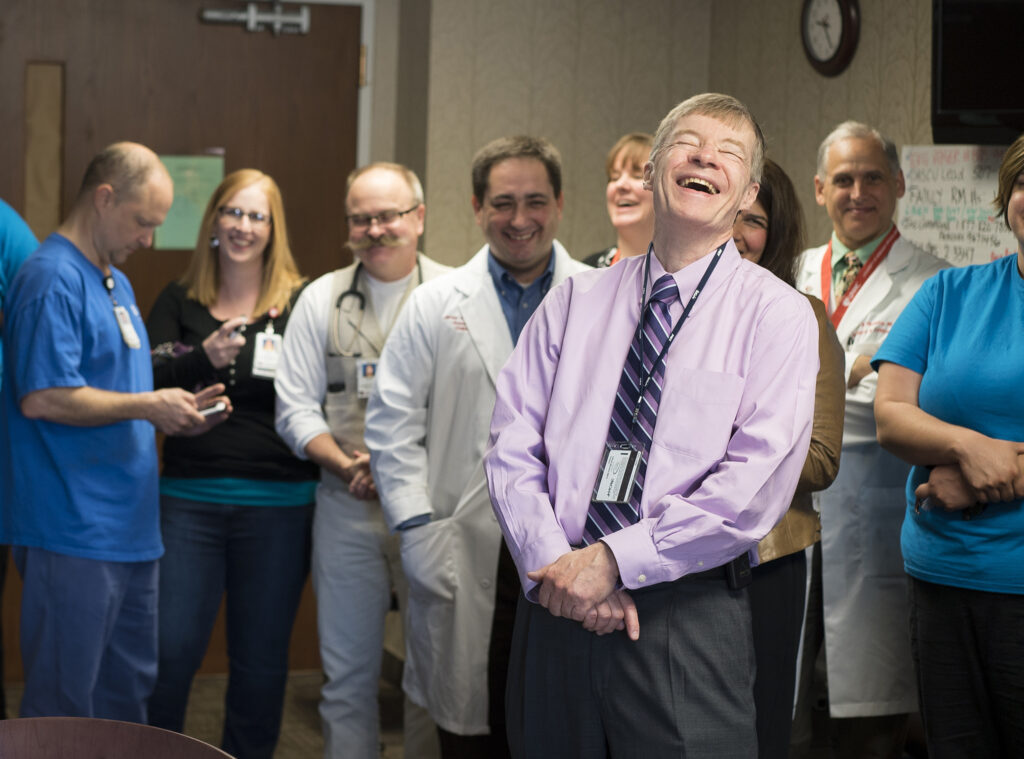
Colleagues and friends described Dr. Smith as a “preparedness nut,” who was a purpose-driven leader, thorough, motivated to tireless inquiry and a strong mentor, yet also humble, compassionate, calm, caring and soft-spoken.
See Dr. Smith’s obituary and information on services.
University of Nebraska President Jeffrey P. Gold, MD, said Dr. Smith was more than an extraordinary physician and scientist.
“Dr. Phil Smith was a true innovator and mentor who understood the importance of preparedness and collaboration in times of crisis,” Dr. Gold said. “His leadership in establishing the Nebraska Biocontainment Unit set a global standard for excellence, and his commitment to training the next generation of health care professionals helped shape countless careers in medicine and public health.”
Michael Ash, MD,CEO of Nebraska Medicine, said:
“Dr. Phil Smith was a pioneer and above all, a compassionate physician and skilled teacher. He faced the Ebola crisis not with fear, but with courage and clarity. He cared for patients with dignity when the world was watching. Nebraska Medicine, and the entire field of infectious disease care, is better because of him. His legacy will continue to save lives for generations to come.”
Dr. Smith and the leadership team of Nebraska’s Biocontainment Unit were thrust into the national limelight in 2014 when three people who had become infected with Ebola were medically evacuated for treatment in the NBU. The team provided what then-President Barack Obama praised as “world-class care” in the Ebola fight.
The biocontainment unit was Dr. Smith’s brainchild. After establishing the Nebraska Infection Control Network in 1980, he championed building a state-of-the-art biocontainment unit, which became the nation’s largest when it opened in 2005.
The unit vaulted UNMC, Nebraska Medicine and the state of Nebraska into the international spotlight, when the first Ebola patient arrived in 2014.
Oral History: Dr. Smith discusses the activation of the Nebraska Biocontainment Unit
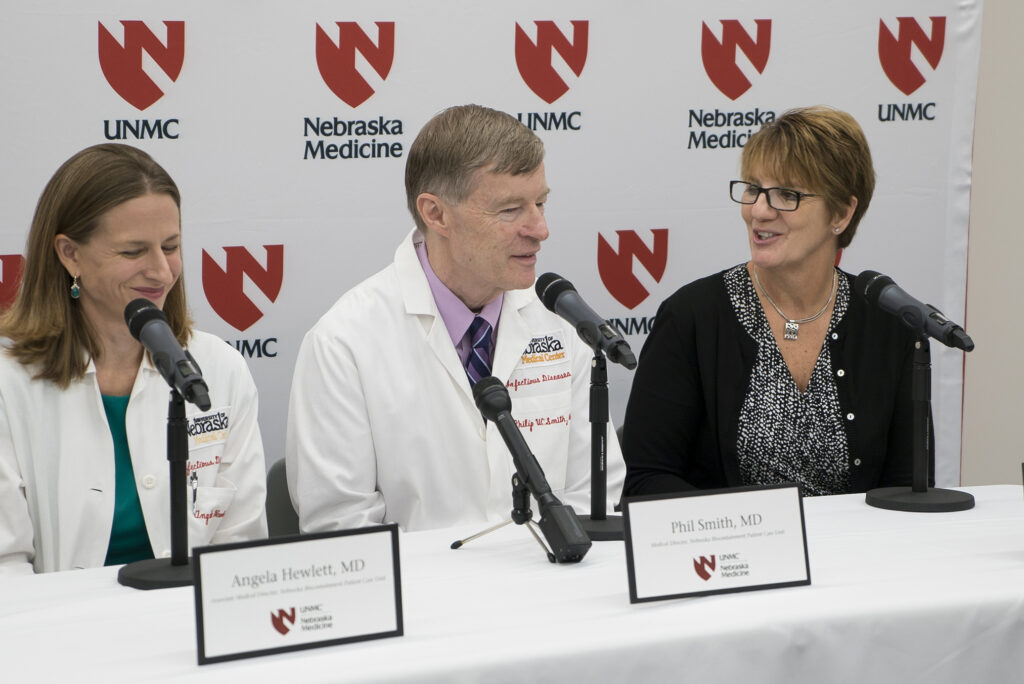
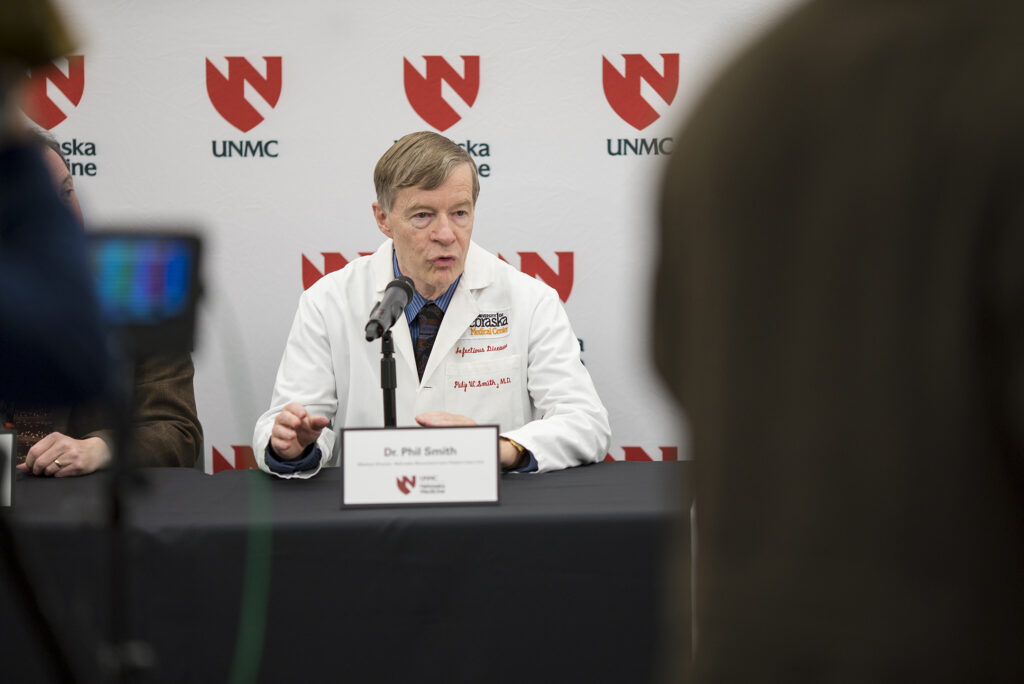
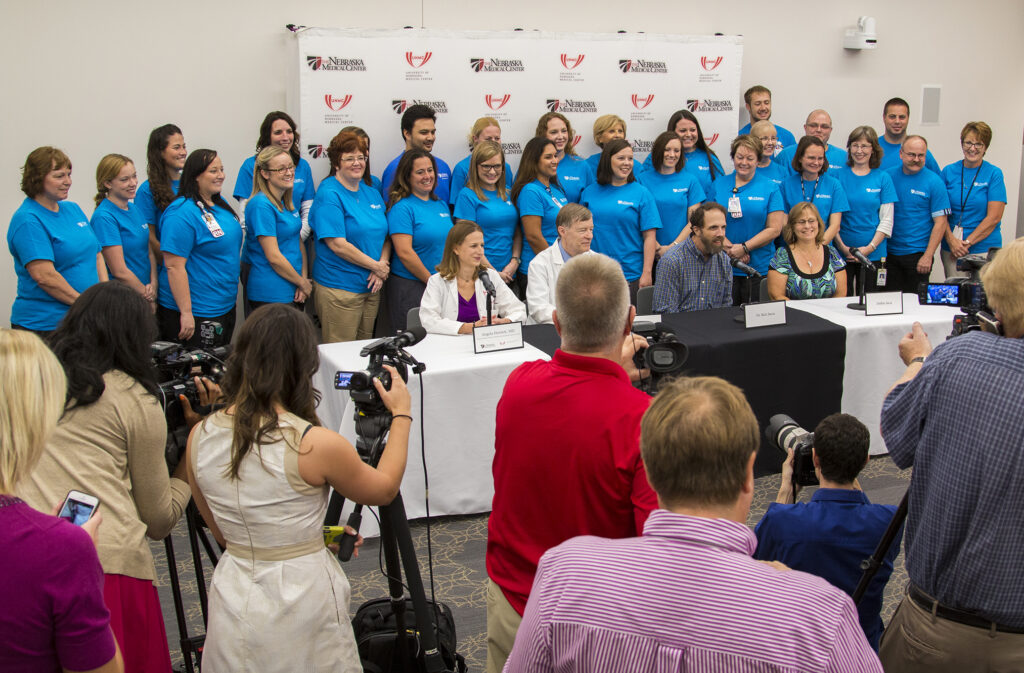
Rick Sacra, MD, one of the patients treated in the biocontainment unit, said Dr. Smith had a “deep and lifelong impact” on him and his family. Dr. Sacra, sick with Ebola, was transported to Omaha from Liberia in September 2014.
While Dr. Sacra was “too out-of-it to even recall the earliest interactions,” he said, “Dr. Smith met with my wife and explained about my situation. He was humble and transparent — he told her there were really no protocols to go on for how to manage Ebola. They were breaking new ground. He had no illusions about the odds of success — but he could promise the team would do their best.
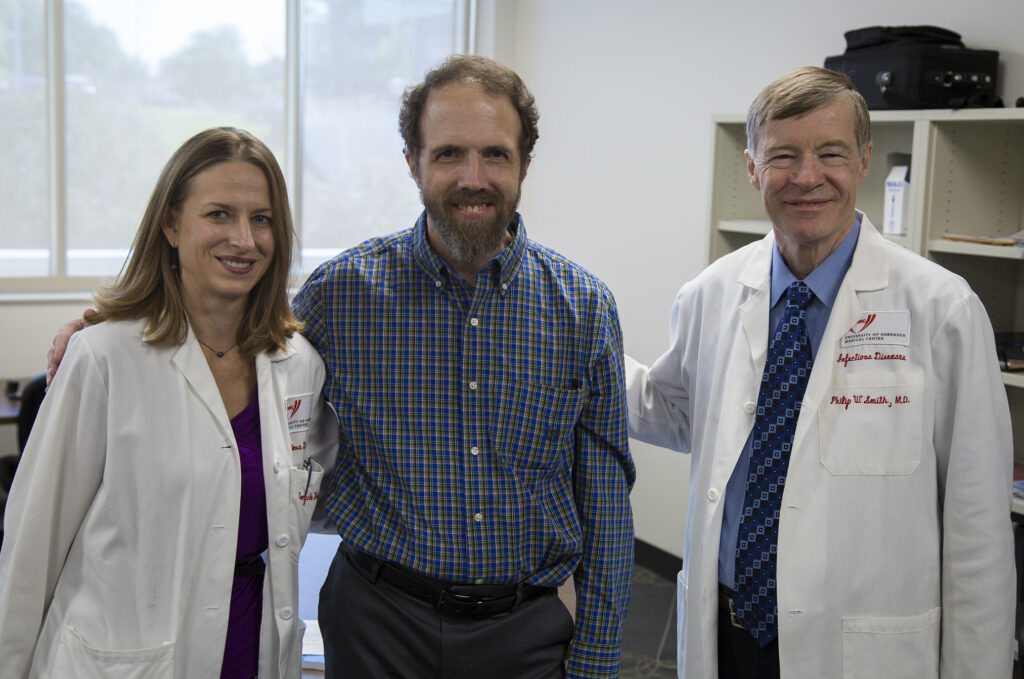
“I remember Dr. Smith coming in each day to talk and to examine me. He was just very down-to-earth, thorough, caring and soft-spoken. He was a very steady leader for the team in the Biocontainment Unit—I could tell that as I observed all the staff interacting with him over the weeks I was there.
“His vision and foresight in spearheading the development of the Nebraska Biocontainment Unit have been so important in responding to serious infectious diseases like Ebola and COVID-19,” Dr. Sacra said.
Shelly Schwedhelm, now associate director of emergency management and clinical operations at the medical center’s Global Center for Health Security, was an important part of the biocontainment unit leadership team during the Ebola event. She remembered Dr. Smith as “the ultimate purpose-driven leader,” a man of intellectual humility, tireless inquiry, compassion, mentorship and calm demeanor who left an incredible legacy at UNMC and Nebraska Medicine.
Memorial service set for Aug. 2
A memorial service celebrating Dr. Smith will be held on Saturday, Aug. 2, at 11 a.m. at the First Central Congregational Church, 421 S. 36th St., Omaha.
“His goal to establish the biocontainment unit at Nebraska Medicine and UNMC was driven out of a purpose to provide a safe haven and quality care for patients with the deadliest diseases and a place where health care workers could practice safely and advance their knowledge and skills, as well as a place where our community could be safeguarded,” she said. “Because of his leadership and mentorship, we are now a recognized world leader. Phil’s imprint on many of us will continue to influence others for generations to come.”
The unit brought Omaha to international attention again in 2020 – after Dr. Smith’s retirement in 2016. That year, the unit and its trained personnel were again called into action as the first Americans with COVID-19 were treated at the Nebraska Biocontainment Unit and monitored at the National Quarantine Unit, which had been built in partnership with the federal government following the biocontainment unit team’s success during the Ebola outbreak.
An emeritus professor in both the UNMC Colleges of Medicine and Public Health, Dr. Smith also was involved in establishing the National Emerging Special Pathogens Training and Education Center (NETEC), a partnership between UNMC and Nebraska Medicine, Emory University Hospital and NYC Health+Hospitals/Bellevue. NETEC manages preparedness and response for all emerging special pathogens across health systems in the U.S.
Dr. Smith was hired in 1977 to develop the infection control program at Clarkson Hospital. In 1998, he became chief of the division of infectious diseases in the UNMC Department of Internal Medicine. A self-proclaimed “preparedness nut,” he also will be remembered for his leadership, wit and love of poetry writing.
Oral History: Dr. Smith discusses the reaction to the activation and the creation of NETEC
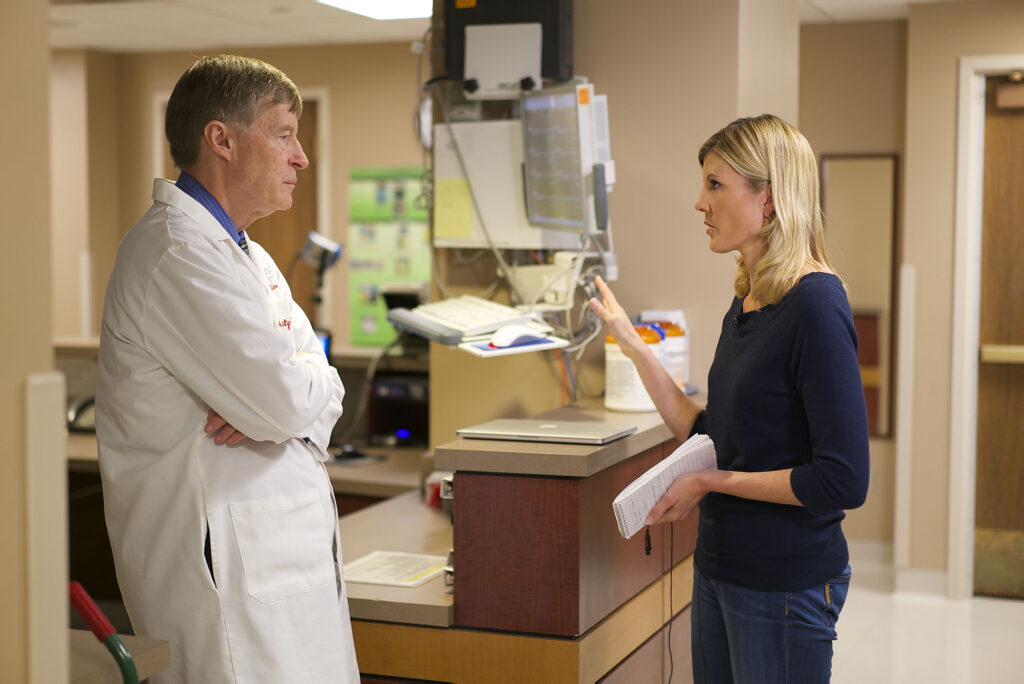
Chris Kratochvil, MD, vice chancellor for external relations at UNMC and vice president for external relations at the University of Nebraska System, said Dr. Smith’s visionary work in health security had a local, regional, national and global impact – while Dr. Smith himself left a legacy of caring.
“Dr. Smith’s efforts led to a world-class biocontainment unit, the Training Simulation and Quarantine Center and the Global Center for Health Security here at UNMC and Nebraska Medicine,” Dr. Kratochvil said. “But more importantly, his life has impacted his family, friends and colleagues in a way that made them better people and inspired them to continue his work to serve, create, assist, collaborate and to make the world a better place.”
Angela Hewlett, MD, George W. Orr MD and Linda Orr Chair in Health Security and current medical director of the Nebraska Biocontainment Unit, was a key member of Dr. Smith’s team, serving as associate medical director of the unit while learning from Dr. Smith. She remembers him as an amazing physician, leader and mentor.
“He was a true pioneer, and although he will undoubtedly be remembered for his lasting legacy in the fields of infectious diseases and biocontainment, he should also be remembered for his profound individual impact on all of us who were fortunate enough to work with him.”
UNMC Interim Chancellor H. Dele Davies, MD, said:
“As a UNMC leader and a specialist in infectious diseases, I stand in awe of the impact Dr. Smith had, not just here in Nebraska, but nationally and internationally. His foresight, bravery and leadership saved lives and will continue to save lives, even as we mourn his passing. The medical center and the national infectious diseases community has lost a giant, and our thoughts go out to his family. With them, we will take comfort in all the good Dr. Smith did and his enduring legacy that will save lives far into the future.”
At an event in 2024, marking the 10th anniversary of Ebola patients arriving in Nebraska, Dr. Smith told his team:
“I’ve never worked with a more capable or courageous group of people in my life. I just want to say, team, thank you. You are amazing.”
Dr. Smith was amazing, Dr. Hewlett said.
“I am so truly grateful for the gift of his support, guidance and friendship over the years. He will be deeply missed.”
Gifts in memory of Dr. Smith can be directed to the University of Nebraska Medical Center (UNMC) Biocontainment Team through the University of Nebraska Foundation, P.O. Box 82555, Lincoln, NE 68501-2555. Please make checks payable to the NU foundation and include a note the gift is in memory of Phil Smith. Gifts can be made directly online at this NU Foundation link.
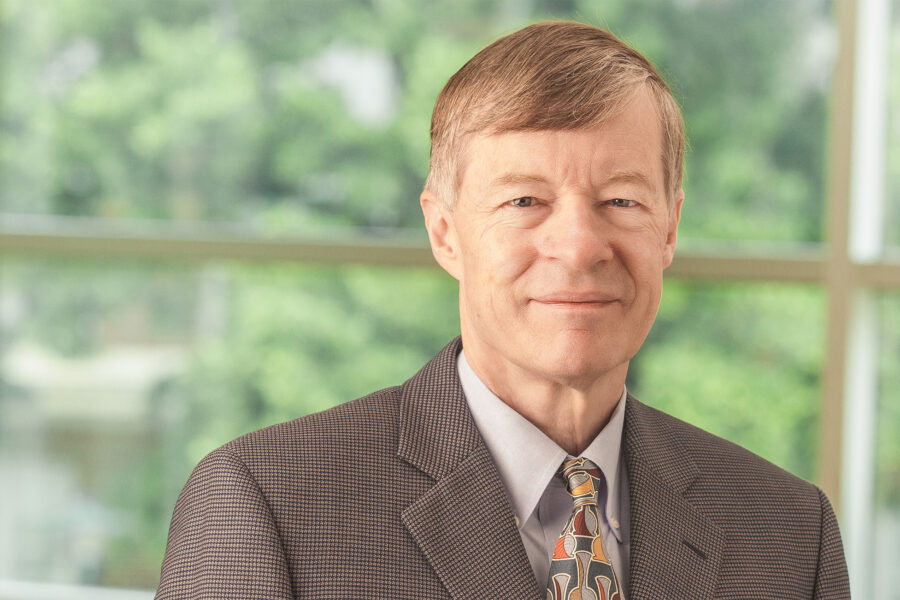
It is with great sadness that we Iowans have learned of Dr. Smith’s passing. Thanks to his guidance and mentorship, a Level 2 biocontainment inpatient care capability exists in our state to serve not only Iowans but Region VII as well. He leaves behind a world that is in a better place because of his compassion, devotion and expertise. He will be sorely missed and fondly remembered by his Iowa colleagues.
A visionary amongst the many. Great leaders inspire the many. He was in so many ways.
Like many other fellows, residents and students I had the privilege of learning from Dr. Smith when I was a medical student rotating at Clarkson Hospital. Brilliant and understated, he was the “goto” guy when patients had difficult problems and their physicians needed Dr. Smith’s skillset. He will be missed….a one of a kind intellect, always looking forward.
Dr. Smith was a wealth of knowledge and always willing to collaborate. He will be missed!
And just when you thought it wasn’t possible for a single human being to be any more beautiful, or have any greater impact, he would read you one of his poems in that voice of his. Whenever faced with a difficult situation, I ask myself: what would Dr. Smith do. He will always be my North Star.
Dr. Smith was a brilliant, kind, and collaborative leader. His exceptional ability and willingness to provide thoughtful mentorship to so many was truly unparalleled. I feel deeply thankful and privileged to have learned from him. Beyond the networks, centers, and systems he created, his impact is evident in the generation of leaders he inspired and guided. He was a remarkable human who will be greatly missed.
Dr. Phil Smith was one of the original public health champions in Nebraska. He translated the science of prevention into strategic, effective practice. He was a delightful and dedicated colleague, who showed me how to make a greater difference, together. May his memory be for a blessing, and may his stories of impact ripple for generations to come.
Dr. Smith never sought the limelight, but he always stepped up when the media asked him to. He will go down in the history books as the man who made UNMC the place to go for biopreparedness. He was the BEST.
Amazing physician and an extraordinary human being. I am privileged to have known and worked with him.
Some may not know that in addition to being a brilliant physician and leader, he was a gifted poet. His book was available at “The Bookworm”!
The Proseko (formerly M2 Medical Intelligence) Team sends its heartfelt condolences to the UNMC family. Dr. Smith was a remarkable man.
Phil joined Seven Doctors Project in 2009 and he was off and running, making new poems and contributing in a full way to our writing workshop. He loved talking with and learning from the writers in our group. He made me laugh a lot. Phil was able to leave his responsibilities at the door for a couple hours a week and write and read with us—a true joy for all of us.